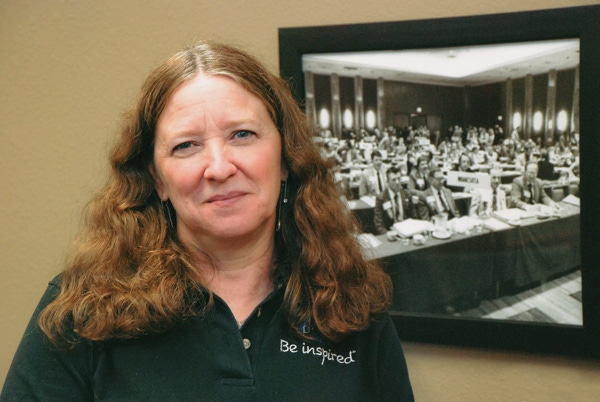2012 Master of the Pork Industry Dianne Bettin
2012 Master of the Pork Industry Dianne Bettin is an unwavering advocate for the pork industry. Bettin believes her pork industry involvement has benefitted their hog operation in several ways. “When you’re involved in the industry, you have the opportunity to see and hear about how others do things on a day-to-day basis. It makes you a better person, and your hog operation will be better because of all of the things you’ve learned,” she explains.
May 15, 2012

At the age of 14, Dianne Bettin moved with her family from the Twin Cities to rural Minnesota. It was quite a “culture shock,” she recalls. Her stepfather was an artificial insemination technician with Minnesota Valley Breeders, so she began her agricultural education at that end of the cow.
In the years that followed, Bettin met and married a pork producer, became active in county, state and national pork producer groups, and embraced agriculture in all its forms.
Early in their marriage, she and husband, Doug, realized that they each had certain things they enjoyed. “Doug is happy hanging out on the farm,” she explains. “Involvement and leadership has always been my thing. I like to try to make a difference. We are both high-energy people. That’s just how we are built. Especially for me; I want to be on the move.”
Married in 1982, the partnership works on many levels. So well, in fact, the Bettins were recognized as the Pork Family of the Year in 2011 by the Minnesota Pork Producers Association. Their son, Tyler, is producer education director at the Iowa Pork Producers Association. Daughter Marisa is a nutrition consultant at Form-A-Feeds, Stewart, MN.
Leadership Surfaces
In 1978, Bettin’s leadership skills were recognized early as she was elected student senate president while attending Minnesota-West Vocational Technical College, Jackson, MN. She graduated in 1979 with a two-year associate degree in sales and marketing.
A storm in 1980 turned Doug’s focus from cattle to hogs. A finishing barn was built, then outdoor Cargill units to farrow 75 sows. Soon, the sow herd grew to 150 sows. In 1995, the Bettins, ready to move to confinement facilities, expanded to 350 sows, farrow-to-finish.
“One thing I remember very vividly when we went from 150 sows in outside lots to 350 sows in the breeding-gestation barn is Doug going on and on about how happy those sows seemed to be now that they all had their own spot and they didn’t have to fight each other for food. Whenever I hear about the controversy over gestation stalls, I think about that,” she reflects.
In 1985, Dianne began an open-studies program offered by Minnesota State University, attending mostly night classes. The high-energy, new mom juggled college courses, two kids and a job until she graduated Summa Cum Laude in 1993 with a bachelor’s degree in administrative management and minors in accounting and business administration.
With the focus on farm and family, Bettin became a part-time administrator of the federal Carl Perkins Grant for career and technical education for a consortium of area high schools. Those responsibilities overlapped a 20-year stint as a paraprofessional working with the Minnesota West Adult Farm Management program.
In 1989, she launched Bettin Computer Records Services, offering a variety of financial bookkeeping services for local businesses and farmers, plus bureau services and training for PigChamp production records. Bettin currently works full-time at Easy Automation Inc., Welcome, MN.
Pork Industry Advocate
In the early ’90s, Bettin began her ascent through the ranks of various county and state pork producer organization positions. She held all offices of the Martin County Pork Producers Association from 1989 to 1996. Martin County is the largest hog-producing county in the state. She spent six years on the executive board of the Minnesota Pork Producers Association, elected president in 2002.
The natural progression of her pork industry career was her appointment by the secretary of agriculture to the National Pork Board in 2003. She has served on the Pork Checkoff Domestic Marketing Committee since 2003 and currently serves as chairman, a position she will relinquish later this year. In 2007, Bettin was named chairman of the National Pork Board’s budget committee.
Benefits Abound
Bettin believes her pork industry involvement has benefitted their hog operation in several ways. “When you’re involved in the industry, you have the opportunity to see and hear about how others do things on a day-to-day basis. It makes you a better person, and your hog operation will be better because of all of the things you’ve learned,” she explains.
“One thing I learned by being involved at the county, state and national levels is that there is more than one right way to do things. Here in Martin County, we have lots of pigs with lots of people managing the pigs the same way. It’s easy to think that this is the way everyone raises pigs. But when you broaden your horizons, you see that some people raise pigs differently. As long as they are not harming the environment and they are raising a healthy, safe product, there can be all kinds of ‘right ways’ to do something,” she continues.
“There is a lot of thought that goes into what pork producers do, and it is backed by a lot of records and technology. The nutrition we use to feed our animals is probably better than what some people feed their kids. We make sure the diets are balanced, that they receive fresh water and they get the care they need to be healthy.
“We can’t afford to not have people involved. We have to put a face on the industry, or pretty soon we will be regulated into a narrow window of what we can and cannot do. We have to show that there is more than one right way to raise hogs,” she reinforces.
Challenges Ahead
On the production side, Bettin cites “risk management and the constant battle for profitability” as key challenges the pork industry faces in the future. Swine health is always a concern, which is magnified in hog-dense areas like Martin County.
“Beyond the day-to-day production challenges, the outside forces and the people who don’t understand — or don’t want to understand — what pork producers do to provide food to a growing population requires vigilant attention,” she says.
The use of gestation stalls is one of those issues, and trying to come to an industry-wide position on them may be unwise, she feels.
“I don’t think there are many producers who think gestation stalls are wrong. Most agree they are a very valid way to house sows. Some producers don’t want to fight the issue any more, and some are unhappy that others have made the decision to move away from stalls. There probably isn’t a good solution to that, and trying to develop policy that leans either way may prove to be divisive,” she explains. “I think it is important that we support producers’ ability to choose whatever option works best in their production system.”
When such a stalemate is reached, Bettin reflects on one of the most valuable lessons she learned in her early work with state legislators. “Sometimes, it is best to agree to disagree and move on, realizing that you can respect people even though there may be a divisive issue that you are not ever going to agree on. You can still move forward for the betterment of the industry and work together on what you can agree on. That’s an important thing, and I think it’s something pork producers have done very well.”
She cites the debates over the packer ownership issue as a similar stalemate. “As an industry, we just had to walk away from that and say we are not going to come to a national position on the issue and perhaps we don’t need to. At the end of the day, if you respect each other, you can walk away knowing you expressed your opinion. You are not going to win them all,” she assures.
In a broader sense, she continues: “I think we have to address the social perception of pork production and agriculture in general, or we will continue to have more and more of these issues come up.”
Pride in Product
Bettin points to her years of service on Pork Checkoff’s Domestic Marketing (formerly Demand Enhancement) committee as some of her most fulfilling. A self-professed “foodie,” she proclaims: “Chefs are my quarterbacks. I love to watch the Food Network, take cooking classes, try new restaurants and meet the chefs. I travel to eat!”
That passion was put to good use when the National Pork Board put out a call for a new advertising campaign a couple of years ago.
“I was fortunate to be deeply involved in the search for an advertising agency to develop a new brand for pork. As committee chair, I was part of a 10-member group that narrowed the proposals to three agencies who were then invited to present their strategies in Des Moines. We selected Schaefer-Condon-Carter as the agency to bring new excitement to pork,” she explains. “We researched and selected a new target market, agreed on the new brand slogan, ‘Pork. Be Inspired,’ then helped coordinate an integrated brand launch strategy. ‘Pork, the Other White Meat’ was a very successful campaign, but we needed something that fits the way people think of food today,” she adds. “We have a fantastic, dedicated staff at National Pork Board and they have really run with this new campaign.”
Open to New Paths
“When I talk to young people in our industry, I am really encouraged because they are so involved in engaging others in social media,” Bettin says. “I’ve always enjoyed teenagers and young people, so anything I can do with young people is a priority for me.”
Her best advice to young and not-so-young alike is this: “Take advantage of every opportunity you can; don’t make up your mind too quickly. If you walk through life avoiding opportunities that might be a little off the path you are comfortable with, you will miss a lot. There are many paths you can take.”
The newest path Bettin will soon take is the Minnesota Agriculture and Rural Leadership (MARL) program, a two-year curriculum to develop the skills of agricultural and rural leaders. The select group of 30 will meet five times a year; one event will be held in Washington, DC, and another is an international trip to be determined. Her goal is to broaden her knowledge of all facets of agriculture.
“From what I have seen and learned about consumer issues and perceptions, a broader base of knowledge is required to address their concerns. My goal is to become an ‘agvocate’ — an agricultural advocate — in addition to being an advocate for the pork industry,” she explains.
You May Also Like



